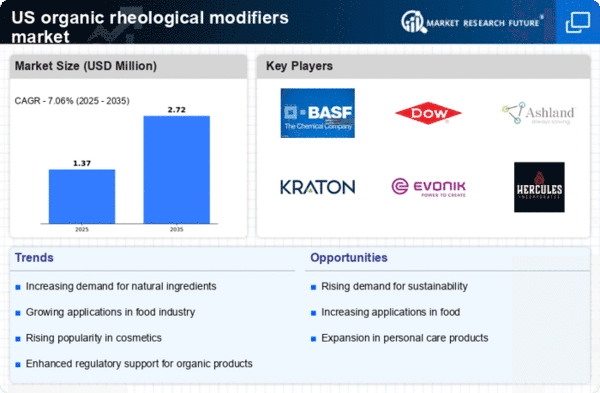Consumer Awareness and Education
Consumer awareness and education regarding the benefits of organic products are playing a pivotal role in shaping the organic rheological-modifiers market. As consumers become more informed about the health and environmental advantages of organic ingredients, they are increasingly opting for products that contain these modifiers. Educational campaigns and marketing efforts by manufacturers are helping to highlight the advantages of organic rheological modifiers, such as their natural origins and potential health benefits. This growing awareness is likely to drive demand, as consumers seek products that align with their values and lifestyle choices. Consequently, the organic rheological-modifiers market may experience sustained growth as consumer preferences continue to evolve.
Rising Demand for Natural Ingredients
the organic rheological-modifiers market is seeing a notable surge in demand for natural ingredients, driven by consumer preferences for clean label products. As consumers become increasingly health-conscious, they seek products that are free from synthetic additives. This trend is particularly pronounced in the food and beverage sector, where organic rheological modifiers are utilized to enhance texture and stability. According to industry reports, the market for natural food additives is projected to grow at a CAGR of approximately 6.5% over the next five years. This shift towards natural ingredients is likely to propel the organic rheological-modifiers market, as manufacturers adapt their formulations to meet consumer expectations for transparency and sustainability.
Growth in the Food and Beverage Sector
The organic rheological-modifiers market is significantly influenced by the expansion of the food and beverage sector in the US. With a growing population and changing dietary preferences, the demand for processed and convenience foods is on the rise. Organic rheological modifiers play a crucial role in improving the texture, viscosity, and stability of various food products. Recent data indicates that the US food and beverage industry is expected to reach a market value of over $1 trillion by 2026. This growth presents substantial opportunities for the organic rheological-modifiers market, as manufacturers increasingly incorporate these modifiers to enhance product quality and consumer appeal.
Technological Advancements in Production
Technological advancements in the production of organic rheological modifiers are reshaping the market landscape. Innovations in extraction and processing techniques have led to the development of more efficient and sustainable methods for producing these modifiers. For instance, advancements in bioprocessing and fermentation technologies are enabling manufacturers to create high-quality organic rheological modifiers with improved performance characteristics. This evolution in production technology not only enhances product efficacy but also aligns with the growing demand for sustainable practices within the organic rheological-modifiers market. As a result, companies that invest in these technologies may gain a competitive edge in a rapidly evolving market.
Increased Regulatory Support for Organic Products
the organic rheological-modifiers market benefits from increased regulatory support for organic products in the US. Government initiatives aimed at promoting organic farming and production practices are creating a favorable environment for the growth of organic ingredients. Regulatory bodies are implementing standards that encourage the use of organic modifiers in various applications, including food, cosmetics, and pharmaceuticals. This support is likely to enhance consumer trust and drive demand for organic products, thereby positively impacting the organic rheological-modifiers market. As regulations continue to evolve, manufacturers may find new opportunities to innovate and expand their product offerings.
















